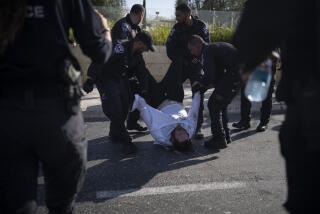Each New Step in PLO-Israeli Peace Process Is Invitation to Backlash
- Share via
JERUSALEM — Whether the Palestine Liberation Organization’s vote to quit calling for the destruction of Israel is, as Israeli Prime Minister Shimon Peres says, the most important decision in the Middle East in 100 years may not be known for another century.
Certainly, the PLO’s vote to revoke clauses in its charter calling for armed struggle against Zionism is an important link in the chain of events that make up the 2 1/2-year-old Israeli-Palestinian peace process. It was a change Israel had sought for decades and one Palestinian leader Yasser Arafat had promised to deliver. Without it, negotiations would have come to a permanent halt.
With the Palestinian vote, Israel now will proceed to withdraw its troops from the West Bank city of Hebron and will move toward opening a promised “safe passage” road for Palestinians between the West Bank and the Gaza Strip.
More important, Israel and the Palestinians will begin May 5 their final-status negotiations over the most fundamental issues for achieving peace: the future of Jewish settlements in the West Bank, control over East Jerusalem, the borders of Palestinian territory and whether that area will become an independent state.
Peres’ Labor Party on Thursday dropped from its platform long-held opposition to the establishment of a Palestinian state.
But each of these links in the chain to peace is likely to elicit another series of reactions ranging from suspicion to hostility to violence, as was evident in the responses to the historic Palestinian vote.
“Everything for a moment seems so right, that the act of revenge that would turn everything upside down seems almost inevitable,” wrote political commentator Nahum Barnea in the newspaper Yediot Aharonot. “No good deed in the Middle East goes unpunished.”
While many Israelis welcomed the news that the PLO officially no longer is dedicated to their destruction, the opposition Likud Party rejected the vote as incomplete. It not only wants the old clauses eliminated, it wants new ones in print as well, to be certain of their content. The PLO left the drafting of a new charter to a legal committee over the next six months.
“It is important to know what this decision actually says, since there are more hidden or concealed things in it than there are visible,” said Jerusalem Mayor Ehud Olmert, a Likud member.
“It’s a hoax. They never can be trusted,” added Binyamin “Benny” Begin, a leading figure in Likud. “A snake with a jacket and tie is still a snake.”
On the other side, the radical group Hamas, which does not belong to the PLO, declared from Amman, Jordan, that the vote was “humiliating” and vowed to continue its violent struggle against Israel.
Hamas aspires to create an Islamic state in the former Palestine, including all of Israel.
The Hamas threat was made real when police discovered the body of a would-be suicide bomber next to a soccer field in East Jerusalem on Thursday morning. The Palestinian, who was killed while attempting to arm a bomb with 22 pounds of explosives, reportedly had a small Koran and an Israeli army uniform with him. Police assume he was headed for an Israeli bus.
Hamas unleashed a wave of suicide bombers in Israel beginning Feb. 25 that left more than 60 dead and interrupted the peace process. That is when Israel delayed its scheduled redeployment from Hebron and imposed a closure on the West Bank and Gaza.
Thursday’s aspiring bomber never made it to a crowd of Israelis, and Palestinian police announced Thursday that they had arrested Adnan Rul, the No. 2 leader of Hamas’ military wing.
Some Jews are equally unenthusiastic about the peace process. Leaders of the Jewish settlers in Hebron called the PLO’s vote a “deception” and warned of bloodshed if the government withdraws its troops from that city, where 400 Jews live in the center of about 100,000 Palestinians. The settlers are heavily armed, and their threat is taken seriously.
The fight over Jewish settlements, Jerusalem and Palestinian statehood--issues at the heart of the struggle between Israelis and Palestinians--is unlikely to be any less volatile. Arafat’s most convincing argument to get members of the Palestine National Council to overturn the anti-Zionist clauses of the charter was that this was a necessary step to continue the struggle for statehood and Jerusalem.
It is the negotiated solutions to these issues that are likely to be the most important decisions of the century for the Middle East: They will determine whether or not there is peace in the next 100 years.
More to Read
Sign up for Essential California
The most important California stories and recommendations in your inbox every morning.
You may occasionally receive promotional content from the Los Angeles Times.













